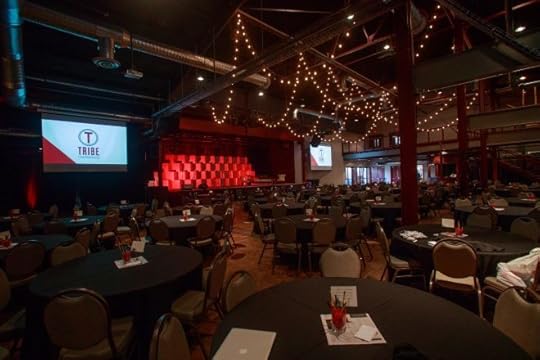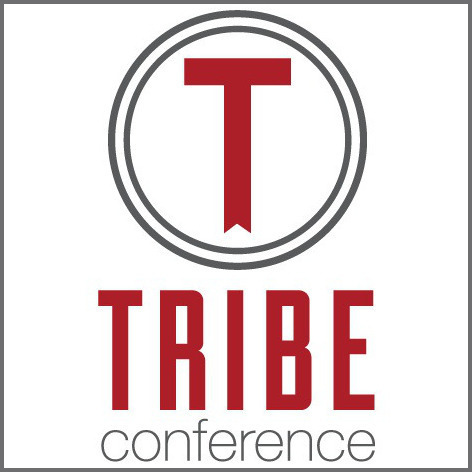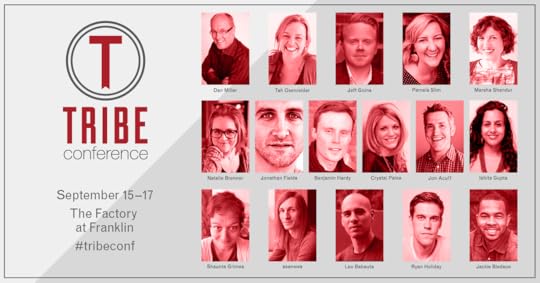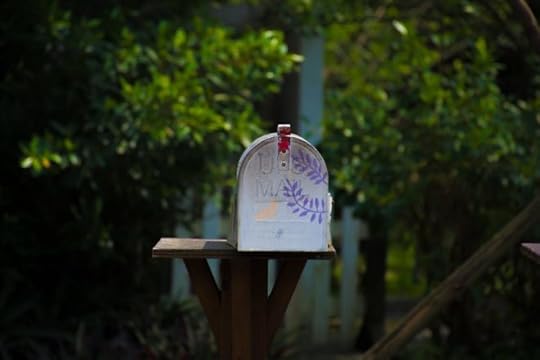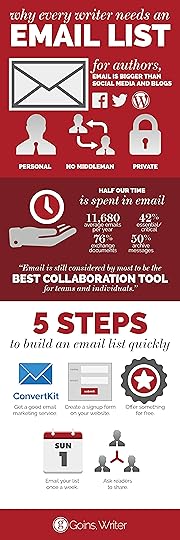Jeff Goins's Blog, page 23
September 11, 2017
A Pivotal Step to Get Past Your Fear of Writing
Have you ever had trouble finding the courage to call yourself a writer? Do you feel the calling, but have no idea how to proceed? That’s exactly where I found myself about a year ago as I walked through the doors to attend Tribe Conference.
It was my very first writers conference. I looked inside at all those people milling around and felt like an imposter. Thoughts of all the things I didn’t have and all that I hadn’t done were racing through my mind.
I had no background in writing.
I had no written work anywhere other than my laptop and a personal journal.
I knew nothing about book writing or blogging
I had never enjoyed social media.
All I carried through those doors was a compelling desire to write and the idea that I needed to do it online. I walked in feeling overwhelmed from trying to figure out how to move forward.
Finding community
I sat down at a table up front and quickly found myself drawn in. Speaker after speaker was encouraging and they all seemed to have confidence in me. I was inspired, and felt understood.
For the first time, I didn’t feel so alone with this unexpected call to write. Everyone else around me shared the same desire. Others who had already been down this road before told me I could do it, but the most impacting statement I heard that weekend was spoken by Jeff:
“You are a writer. Now call yourself one!Tweet thisTweet
That thought slowly began to take root in my mind. I understood that answering the calling to write was a step of obedience to what I felt God had called me to do.
That first step was finding the courage to call myself a writer.
At the end of the conference, I walked away still uncomfortable with the idea that I could be a writer, but calling myself one nevertheless. I went home, worked my way through the Tribe Writers course, prayed hard, and struggled through a huge learning curve.
On November 9th, 2016, I launched my blog.
Success can’t be measured
Surprisingly, it worked! And here is what happened:
Over 1,900 subscribers
Over 1,300 followers on social media
Top 4 articles receiving a total of more than 180,000 social shares
Consistent averages of over 2 million monthly views on Pinterest
Some might define success by the things I just listed above, but what I’ve learned on this writing journey is that the things you can measure don’t make you successful. These are temporary and could fade away at any time.
“The things you can measure don’t make you successful.Leslie NewmanTweet thisTweet
Real success is made up of the things that can’t be measured by any standard. They are the things of lasting impact.
Real success is courage. Without the courage to call ourselves writers, the difference we could make, the things that God can do through us, would forever remain a closed book.
Real success is sharing your story. Sharing my story of my struggle with perfectionism was the hardest thing I think I’ve ever done. Being that transparent in front of the whole world? No thank you! But because of it, others have been encouraged. Through the writing of a far away friend, they begin to see that someone else understands, too.
Real success is generosity. How many times did I hear that at Tribe Conference? “Be as generous as you can be.” Generosity draws people in. It makes them feel connected. Generosity is powerful because it speaks of love and there’s a world of people out there that need to know someone cares. Pay it forward. Give all that you can give. In the process, you will end up inspiring and helping others in ways you can’t even begin to imagine.
Real success is making a difference. Social shares are nice because they are an indicator that what we are doing is striking a chord somewhere, but the real reward comes in other ways. When a reader tells me they have been touched by something they’ve read or received when they visited the blog, that’s priceless! Making a difference? Having an impact in some positive way on another person? What could be better than that?
When I think about all that has come to pass between then and now, I’m amazed. When I left Tribe Conference I was not prepared for what God could do with that first step of obedience. I was also not prepared to truly believe what Jeff told me when I said, “You are a writer.”
But I was determined.
Determination matters
There were days I wanted to slam my computer shut in frustration. I couldn’t find the words, and learning the technology was driving me crazy.
The transparency and digging things out from deep in my soul felt like more than I could handle. Sharing the things I struggled with was embarrassing.
But on those days I remembered, “I am a writer.” I knew deep inside that this was something that was not about me at all. It was meant for someone else.
I couldn’t quit now.
“Determination matters because you will want to quit.Leslie NewmanTweet thisTweet
Action is your best defense against fear
I am a writer, and you are, too. So take a take a deep look inside yourself. There are words there waiting to be born. There’s a book or a blog that’s waiting to be written.
There’s help for you, too. Jeff has some great resources for you right here. I was also encouraged by Jeff’s reminder that our words make a difference in this post.
Most importantly, don’t be afraid to reach out with your words and take the hand of the one walking behind you. Your story will make a difference to someone who desperately needs to hear what you have to say.
“Don’t be afraid to reach out with your words and take the hand of the one walking behind you.Leslie NewmanTweet thisTweet
Find the courage to act on your calling and take that monumental first step. Without it, those immeasurable things that could touch another life and mark true success in your writing journey will never have the opportunity to come about.
Be determined, have confidence in yourself, and remember what Jeff always says, “You are a writer. Now call yourself one!”
Do you find yourself in a place of fear like I was? Is taking that first step in believing you are a writer feel scary? You aren’t alone! Let’s encourage each other in the comments.

September 4, 2017
How to Make Money Off Your Art: 3 Things You Absolutely Have to Do
When I was a kid, I dreamed of drawing cartoons like Garfield and The Far Side. As a teenager, I played music with a drummer-less band, which we cleverly named Decaf. In college, I fantasized about writing a book some day. But honestly, it just seemed too far-fetched.
No matter the age, I have always loved art, creativity, and making things out of nothing. But in each season of life, some adult or teacher or relative would see my love for all things creative and always say the same thing:
You can’t make a living off art. You’ll starve.
I believed them. After all, these were adults. So the first decade of my adult life was spent pursuing safer and more predictable paths. I worked in a call center as a telemarketer, then at a nonprofit as a marketing director. During that time, though, I kept feeling like I was missing something.
One day in my late twenties, I made the decision to become a writer. I didn’t know what writers did exactly, but I assumed one thing was that they wrote every day. So, I did that, starting a blog and publishing a new post every day for a year.
Each day, a few more people would read the blog and subscribe to it. By the end of that first year, I had built an audience of over 10,000 readers. A year later, I published two books, launched an online course, and quit my job after quintupling my income.
Since then, I’ve been writing books and running a creative business. Over the years, I’ve met many others who have done something similar. And the whole process has surprised me, because it flies right in the face of that well-meaning advice all those adults gave me years ago.
You actually can make money off art. Over the past two years, I’ve interviewed hundreds of professional makers, writers, and creative entrepreneurs who are doing just that. And what I learned surprised me.
Turns out, there is an underground movement of creative professionals who are thriving in every respect of the word. And here are three lessons I learned from them, along with some practical steps for those who want to follow in their footsteps:
1. Join a scene (or create one)
Almost every person I interviewed told me that becoming an artist was a choice, not some talent they were born with. Part of this choice included joining a community of people who would encourage their creativity. For me, that meant going to conferences and coffee shops where other writers were gathering. It meant joining the scene.
“Becoming an artist is a choice, not some talent you are born with.Tweet thisTweet
Here’s what you can do:
Find a local place where people are already gathering where you could meet others in your niche or industry. If such a gathering doesn’t exist, create your own. Meetup.org is a great resource for finding and creating your own events.
Choose one event, whether it’s a retreat or a seminar, that will help you find your people. An inspirational conference like the Tribe Conference might be a great start.
You either have to join a scene or create one. There is no escaping this. Of course, sometimes, the place where you live doesn’t have the opportunities you need to succeed, in which case you either have to go find the opportunity or create it right where you are. This was one reason why I created a conference. When the thing you need doesn’t exist, that often means you’re the one to create it.
2. Practice in public
Stephanie Halligan grew up wanting to make cartoons for a living. Then adulthood happened, and it wasn’t long before she was working a job she didn’t love to pay off $30,000 in student loans. Finally, she decided that she needed an outlet. She needed to get back to drawing.
So she started sharing small pieces of art every day on a blog called Art to Self, which were meant to be small letters of encouragement to herself. The eventual result was a community of fans who eventually started buying her work.
“You can’t build an audience without sharing your work.Tweet thisTweet
Here are a few practical tips on getting started:
Find a channel where you can share one piece of work every single day.
Start a blog or a YouTube Channel.
Get on Instagram or Snapchat. And share one small piece per day.
You can’t build an audience without sharing your work.
3. Always charge something
Melissa Dinwiddie loved calligraphy, hand-lettering, and other art forms. She made things for her friends for free but secretly wanted to make money off it. Still, she was afraid to charge for her work.
A friend finally forced Melissa to accept $20 for a small piece, because they both agreed that’s how much she would have paid for a similar piece at Target. And for here, this was just the beginning.
Today, Melissa is a full-time artist, teacher, and author.
Here’s how you can do something similar:
Pick a small price that allows you to start charging for your work. Set a precedent of value.
Then, from there, gradually raise your prices. This will create confidence in you and value in the market.
Finally, you can charge what you’re worth once the demand is there.
Real artists don’t starve
What I learned from this little experiment, which eventually became a book, is that real artists don’t starve. At least, they don’t have to. The story of the Starving Artist is a myth.
Myths are stories we tell ourselves to make sense of the world around us. When you tell yourself a story that artists must starve, you end up starving. But when you tell yourself another story, that real artists can thrive, that also becomes true.
So, it seems, the choice is yours.
Which of these steps can you take next? What is your best tip for new artists? Share in the comments.

August 31, 2017
How to Spot (and Use) the Invisible Power of Influence: Interview with Jonah Berger
People want to believe they are good at making their own decisions. From what they buy to who they vote for. It’s easy to see other people being influenced, but we have difficulty seeing it in ourselves.
We tend to hold a curmudgeonly attitude when it comes to being influenced or manipulated. And yet, everyone wants more influence. We hear a lot of people talking about how to become an influencer, and how to engage with influencers.
It’s seems like the “Age of the Influencer.”
Our guest this week on The Portfolio Life, has a counterintuitive approach to what actually influences us, and how to use it to our advantage.
Listen in as Jonah Berger, a Wharton professor and bestselling author, and I talk about why it’s easier to observe other people being influenced, why doing the opposite is still being influenced, and why writing down your goal improves your performance.
Listen to the podcast
To listen to the show, click the player below (If you’re reading this via email, please click here).
Show highlights
In this episode, Jonah and I discuss:
Unpacking the concept of social influence
How we are passively influenced by observing others
The sweet spot of optimal distinctiveness
How to positively influence others and be more positively influenced
Trying to avoid influence during the creative process
The danger of creating in a vacuum
How to write something accessible, but a little bit different
Illustrating complicated concepts in a way that’s accessible to your readers
A simple trick to improve rapport and get better tips
Finding motivation to write
Appealing to peer pressure and social comparisons
The hidden value of a “designated dissenter”
Quotes and takeaways
Recognize influence in the world around you to live a happier, healthier life.
Use the tools of influence to be more influential yourself.
Optimal distinctiveness communicates added value that people can relate to.
Answer the question: What’s an interesting way to tell a familiar story?
“When someone is like us, we feel like we’re part of the same tribe.” –Jonah Berger
“To have influence, we first have to be able to recognize influence.Jonah BergerTweet thisTweet
Resources
Jonah’s blog and Twitter
Invisible Influence by Jonah Berger
Contagious by Jonah Berger
Made to Stick by Chip & Dan Heath
The Tipping Point by Malcolm Gladwell
Powers of Two by Joshua Wolf Shenk
The Wisdom of Crowds by James Surowiecki
When was the last time you noticed being influenced? Who are you trying to influence? Share in the comments.

August 24, 2017
Doing Good is Simple: Interview with Chris Marlow
Too often people fight tooth and nail to claw their way onstage only to realize, after standing in the spotlight for a moment, they don’t have anything to say. Building a digital platform without a purpose can have the same effect.
In a world of likes, hearts, retweets, and comments, influence feels like a currency. And the more influence you appear to have, the more successful you seem. But, as our guest this week on The Portfolio Life asks, why should people listen to you?
Chris Marlow, founder of Help One Now and author of Doing Good is Simple, used to gag at the word “platform”, but had a change of heart. He now encourages platform builders to embrace the generosity factor while pursuing their dreams to create sustainable businesses.
Chris champions the simplicity of doing good and works tirelessly to develop practical ways people can use influence to make a difference in the world.
Listen in as we talk about a chance meeting at a gas station that changed Chris’ life, a key ingredient to creating significant change, and why you don’t have to say yes to every thing.
Listen to the podcast
To listen to the show, click the player below (If you’re reading this via email, please click here).
Show highlights
In this episode, Chris and I discuss:
How your platform can do good locally and globally
What do you do when a platform falls in your lap
Why it feels awkward when you don’t share your influence
Creating simple tools to empower and equip people to give
Simplifying the complexities the world faces
Practical ways you can use influence to help others
How an appetite for success can consume your character
Finding a voice of reason
Integrating doing good into the rhythms of your life
Quotes and takeaways
Without influence we can’t make or create change.
You can’t avoid going broke if you don’t get paid.
If you’re going to stand a stage, you need something important to say.
Give away the influence of your platform to serve a greater purpose.
Tangible outcomes make staying on mission easier.
Wealth is not directly proportional to your capacity for joy.
“Success without being a good neighbor is meaningless.” –Chris Marlow
“When we make our lives about others, we live better lives.Chris MarlowTweet thisTweet
Resources
Doing Good is Simple by Chris Marlow
Help One Now
Tribe Conference (Chris will be there!)
How are you using your platform to make a difference? What can you do to leverage your influence for good? Share in the comments

August 17, 2017
How to Pivot to Find Your Passion (and Get Paid): Interview with Mignon Fogarty
The path to our life’s work is rarely linear. I studied Spanish and Religion in college, and now I write books and create digital content that has little to do with either topic. Perhaps it’s not what we learn, but the journey of learning that leads us to our passions.
Our guest this week on The Portfolio Life, originally graduated college with a degree in English, and went back to study science where she ended up in a PhD biology program at Stanford. While there she took a leave of absence to join a startup, survived the Dotcom boom as a freelance technical writer, and launched a top-rated grammar podcast that led to a book deal and a full-time career as an entrepreneur.
Listen in as Mignon Fogarty (aka Grammar Girl®) and I talk about her journey as a lifelong learner, launching a podcast network, how she wrote seven books in six years, and became a professor.
Listen to the podcast
To listen to the show, click the player below (If you’re reading this via email, please click here).
Show highlights
In this episode, Mignon and I discuss:
How Grammar Girl started as a hobby and took off unexpectedly
What it’s like to get invited to appear on The Oprah Winfrey Show
The mechanics of building a podcast network and finding sponsors
Deleting the first 8 episodes of her podcast because they were so bad
Repeating the cycle of learning and mastery with new skills
Finding the right partner for a collaborative business
Why it’s never too late to break into the writing industry
How her business venture with Macmillan works
Conflicting advise about social media from publishers
Why you don’t have to be an expert at something to write about it
Recognizing your limitations and embracing your inherent strengths
When to incorporate your writing business
Takeaways
“I don’t think I could ever be content doing just one thing.” –Mignon Fogarty
“Consistency and frequency are more important than the actual platform itself.” –Mignon Fogarty
Prioritize creating over content distribution.
“Just stick with it.” –Mignon Fogarty
Produce content regularly over a long period of time.
“You don’t have to be an expert. You just have to be good at finding information.” –Mignon Fogarty
Putting yourself in the position to help others causes you to become an expert in order to serve them.
Your readers are looking for you on social media. If you’re not there, they can’t find you.
“Just because you’re not good at something doesn’t mean you can’t be good at something else.Tweet thisTweet
Resources
Grammar Girl podcast
Grammar Girl’s Quick and Dirty Tips for Better Writing
Quick and Dirty Tips podcast network
Grammar Girl on Twitter
What are you learning about lately? How has learning something new helped you pivot? Share in the comments

August 14, 2017
Why I Created a Conference in a World of Too Many Conferences
The world doesn’t need another conference. There are enough summits and meetups and festivals to last a few lifetimes. And we certainly don’t need another event telling you that you aren’t doing enough.
What there may be room for, what we just might need, is not another busy extravaganza with every minute of the schedule packed to the max, but rather, a place to breathe. A place to be. An experience that leaves you changed.
We don’t need another event with too many people to meet and soon forget. We don’t need more information, another swag bag full of junk and business cards you have no intention of keeping.
But when I look around, I see a gap. I see an opportunity.
As a writer, two types of conference catch my eye:
Your typical writers’ conference, during which you usually get all kinds of great writing and storytelling advice, and maybe a chance to meet an agent or a publisher. By and large, these events are not up to date on the latest technology or trends in self-publishing, social media, and all the other ways working writers make a living today.
The social media and blogging conferences, which focus more on tactics to build an audience and make money, but aren’t necessarily helpful when it comes to finding your voice and honing your craft.
What many writers are looking for — what I’m looking for — is something in between those two extremes. Or perhaps, both. But when I started looking for such an event, I couldn’t find it. So I created Tribe Conference.
The lesson here is simple: when you can’t find the thing you need, go create it.
What the Tribe Conference is and how it’s different
Tribe Conference is a gathering of writers, creatives, and artists who want to find the audiences their messages deserve without compromising their craft.
If you find yourself worn out by yet another blogging conference telling you about the latest social network or another speaker encouraging you to “just keep writing,” and you want more than simple tactics or empty inspiration, then Tribe Conference is for you.
“When you can’t find the thing you need, go create it.Tweet thisTweet
This is a curriculum-based conference. We follow a set of proven steps (based on my popular online courses for writers and bloggers) that will help you find the audience your writing deserves. Which is the foundation of building a platform that can allow you to write and create full-time.
Here’s how it works. Each session lasts a few hours and includes at least 2–3 speakers per session. I, Jeff, act as the emcee and resident sherpa to help guide you through each session and connect the various teachings from the featured speakers.
Session 1: Honing Your Voice
In this session, we’ll talk about what it means to be a writer and communicator and why how you say it matters just as much as what you say.
Session 2: Establishing Your Platform
During this session, we explore what it means to build a platform that gets you noticed today. This is where we cover the nitty gritty of websites, podcasts, and more. You will receive both strategic and tactical advice on what to do to begin building or improving the platform you have.
Session 3: Expanding Your Reach
After laying a solid foundation, we look at the tools and techniques you need to increase your influence. These include email marketing, social media, networking, and more. In this session, you’ll learn what it takes to grow your platform and find your tribe.
Session 4: Going Pro
Finally, we will challenge you to take your tribe to the next level and make a living off serving your audience. Here, we talk about publishing and other means of getting paid for your work.
The speakers
Who are the speakers, and how do they fit into a curriculum-based conference?
Well, first of all, the speakers are my friends. Every person who steps up on that stage is someone I know and trust. And because of that, you, too, can trust them.
We follow the same four-step process each year, but the event is always changing. The reason for this is each guest speaker brings a different perspective and area of expertise with them. So the proven process is the same, but the way it is taught is always changing.
This is the best of both worlds. You get a practical process that gets you real results, all while seeing a dynamic set of professional speakers doing their best work right before you.
Who exactly are these people?
They’re best-selling authors and activists. They’re full-time novelists and professional finance bloggers. Most of all, they are people who have found their voice, established a platform, expanded their reach, and gone pro. In other words, they’re worth listening to.
Here’s a taste of who they are and what some of them will share:
Dan Miller is going to share how a small investment over 50 years ago has led to a lifetime of lucrative writing and other creative projects — and how you should always be investing in your growth.
Tsh Oxenreider is going to share her journey of becoming a popular blogger and how she keeps thinking simple so she can focus on her art.
Pamela Slim is going to talk about how to generously create and nurture communities.
Marsha Shandur is going to coach us on how to not be awkward, introverted creatives and instead engage with people in a way that allows our work to spread.
Jonathan Fields is going to wow us with insights in psychology, neuroscience, and creativity (and probably some other cool stuff because he is really smart).
Benjamin Hardy is going to share his journey of getting 100,000 readers in a year and using that to recently acquire a multi-six-figure book deal.
Crystal Paine is going to talk about why making money isn’t a bad thing.
Jon Acuff will encourage us all to finish in the projects we start.
Ishita Gupta is going to talk about resilience in the creative journey.
Shaunta Grimes will share her journey of going from broke author to full-time writing, making over $100,000 a year.
Sean Wes is going to talk about finding your voice and the importance of daily practice.
Leo Babauta will share from his wealth of experience, being one of the top bloggers in the world.
Natalie Brenner will share lessons learned in real time about self-publishing her first book.
Ryan Holiday is going to talk about what it takes to become a perennial bestseller.
Jackie Bledsoe will share his journey of going from struggling freelance writer to successful published author.
We also have a couple of guest speaker panels, which we’ll be sharing more about soon. And so much more. (Last year, there were musical guests and surprise gourmet donuts, among other things. You just never know.)
What you get when you come
When you sign up for the Tribe Conference, you can choose one of two options:
Standard ticket
This ticket gets you all three days of the conference, including every main stage session and some refreshments during the event (plus other random surprises we throw in), and all the videos from Tribe Conference 2016.
During this year’s event you will learn how to:
Clarify your message
Demystify the art of building an online platform
Find your 1000 true fans
Get paid and published for your message
BONUS: Onsite coaches will be offering free one-on-one sessions.
Premium ticket
When you choose to upgrade to the premium ticket, it includes all of the above, plus:
An exclusive dinner with the speakers
A VIP lounge with snacks, refreshments, and other surprises
Daily breakout sessions with speakers and staff
BONUS: Private two-hour workshop with me (Jeff) where I’ll help you apply what you’ve learned in a small group setting with 1×1 help.
Once you’ve decided which ticket is best for you, all that’s left to do is show up ready to learn.
Every dollar we make goes directly toward making this the best conference you’ve ever attended. We want to make this an unforgettable, life-changing experience.
Everything we do at Tribe Conference is about people — it’s about helping you connect with the tribe you need to go pro and to create a space where community can happen right now.
We believe that every story of success is a story of community. And we’d love to be that community for you.
Will you join our tribe and let us help you find yours?
Early bird pricing for the Tribe Conference expires tonight at midnight! Get your ticket before the price goes up. Learn more here.

August 7, 2017
Why Every Writer Needs an Email List
Every writer needs an email list. It’s just that simple. If you want to write a book that actually sells, you need people paying attention to your work. And the best way to do that is with an email list.
Many writers don’t get the attention they deserve, and this frustrates me. Their messages fade into oblivion before they even have the chance to be heard. Why is this? Because many writers neglect the single-most important tool to their success: their email list.
Email is king. It is, hands down, the best way to build an engaged audience, sell a product, or create excitement around your next project. Without an email list, you will struggle to get the traction your message deserves and leave your fate up to chance.
Don’t do that.
In this article, I’ll share with you why every writer needs an email list, some of the myths people have believed about email marketing, and how to get started building your email list today.
Need help setting up and using an email list? Check out the best email marketing tool for writers and bloggers: Convertkit.
The biggest “social network” in the world
First things first: why is an email list so powerful, especially for writers?
Because email is personal. It’s a friendlier medium than blogging or even social media. When people see your email in their inbox along with all their other friends, this builds trust.
Because email is an asset. With Twitter and Facebook and other channels, you have to go through the “middleman” to access your audience. But with email, your message is delivered straight to your readers. You don’t need anyone’s permission.
Because email is private. When you start a conversation in someone’s inbox, they feel like they can be themselves and share whatever they may be struggling with, what they want, or questions they have. I love the rapport this builds with readers.
Nearly every person in the world has an email address. With over 3.9 billion accounts in the world (according to a study by Radicati ), three-quarters of which are consumer accounts, email is by far the biggest marketing channel in the world. That number was projected to reach 4.9 billion email accounts in 2017.
That means email outnumbers all the users on Twitter, Facebook, LinkedIn, and every other social media channel — combined. That makes it the world’s largest social network. If you haven’t tapped into the power of email marketing, then you’re missing out on an incredible opportunity to engage with the people who want to hear from you.
Email is not dead
But wait a second. Isn’t email dead? Maybe you’ve heard this, that people don’t read email anymore or that it’s better to use Facebook or Snapchat or whatever these days. But if you’ve believed these claims, I have bad news for you: you’ve been duped.
““Reports of my death have been greatly exaggerated.” —EmailTweet thisTweet
If email is dead, then why does every social network ask for an email address before you can create an account? Why do most people still check email first thing in the morning? Because email is still the most popular way for people to communicate online.
Every day, people check their inboxes (often multiple times per day). They sit in front of a screen, glued to Outlook or Gmail, refreshing until they get that gratification of knowing someone else in the world cares about them.
Certainly, the way people communicate online is changing and some may not be reading or using email as much as they did a decade ago. But email is not dead — it is very much alive and well. And being almost as old as the Internet itself, it’s not going away anytime soon.
In spite of these false claims of its death, email continues to stick around, outlasting many of the marketing fads that have come and gone. Email still plays a critical role in a most people’s lives. As Barry Gill from the Harvard Business Review says:
Email is not dead, it’s just evolving. It’s becoming a searchable archive, a manager’s accountability source, a document courier. And for all the love social media get, e-mail is still workers’ most effective collaboration tool.
According to a recent study, email is still an important part of many people’s work lives, with the average person spending up to 50% of their time in the inbox. Here are some other interesting facts about email:
The average worker receives 11,680 emails per year with an average of 32 per day.
42% of all email in a person’s inbox is considered essential or critical.
Email is still considered by most to be the best collaboration tool for teams and individuals.
People use email for more than sending messages: 76% use it to exchange documents and 50% to archive important messages.
If you’ve been avoiding building your email list because it seems like an outdated technology, it’s time to face the facts. Email isn’t going anywhere. And if you’re a writer, you need an email list.
Why every writer needs an email list
I was talking to my publisher the other day about marketing strategies for my next book, and do you know the first question they asked was? It was: How big is your email list?”
They didn’t ask, “How many RSS subscribers do you have?” or “How many ‘hits’ does your blog get?” They asked about my email list: the most important asset an author has in their toolbox.
My friend Tim Grahl, the book launch expert, tested this in his book marketing agency and found that email was nearly 100 times more effective than social media in selling an author’s book.
“Email is nearly 100 times more effective than social media for authors.Tweet thisTweet
I’ve personally seen this myself with a recent book launch where the book sold 15,500 copies in the first two weeks of the launch. Do you know how many of those were sold via social media? About 500. And the other 15,00? Well, that was all thanks to email.
As a writer, I get more “mileage” out of my newsletter than any other platform, including my blog. When I send an email to my list, I often get hundreds of replies, far more engagement than a blog post gets. If I send a link to my email list, people click it. If I ask a question, people answer. If I talk about my new book, people buy it.
Of course, this doesn’t just apply to writers. Musicians use email to get word out about their next tour. Retailers use it to share special deals and drive sales. And of course, authors use it to announce news of their next book.
It’s all about the list. And if you don’t have one, you’re in trouble.
How to quickly build and grow an email list
So, you need an email list. I hope that’s clear by now. But how do you get started? Here’s what you need to do:
Get a good email marketing service. This means more than just Outlook or Apple Mail. You need a way to send one message to lots of people all at once. For this, I recommend ConvertKit. It’s affordable and easy to get started.
Create a signup form on your website. It needs to be obvious and not hideously ugly. If your website doesn’t have a clear opt-in form, then you’re missing out on a lot. If you don’t have a self-hosted blog yet, watch this 8-minute tutorial on how to get started.
Offer something for free. This can be an eBook or a free article series or whatever your readers find valuable. It’s a way to reward subscribers with something other than just your regular content. For a step-by-step tutorial on how I did that, check out this article: The Essential Guide to Writing an eBook and Sharing it with the World.
Start emailing your list something new once a week. Don’t overcommit to a frequency like once a day or even a few times a week. Start small and be consistent. A weekly newsletter is plenty. What should you send? Whatever you want. For many, just a short message or article is a great way to begin. Your main goal is to add value and be helpful, so that people continue to read and pay attention. If you make it about them, they’ll make it about you.
Ask readers to share. If you do a good job of adding value, people will want to share your stuff. But it doesn’t hurt to ask them once in a while to tell their friends. For this I like using clicktotweet.com and have readers send their friends and followers to my newsletter signup form.
Don’t forget: Always be generous
And then, what do you do once you’ve launched the email list and started collecting subscribers? Once you have the right tools and start building your list, where do you go from there?
Well, hopefully forward.
But here’s an important tip: Instead of seeing your email list as “yours,” what if it was theirs, something you shared with your community, something you stewarded instead of hoarded? When people give you permission to talk to them, you have a great opportunity and an important responsibility. You can choose to invite or interrupt. To exchange ideas or blast out information. To give or take.
As marketing expert Seth Godin says:
If your email promotion is a taking, not a giving, I think you should rethink it. If you still want to take the time and attention and trust of your 4,000 closest friends, think hard about what that means for the connections you’ve built over the years. There are few promotional emergencies that are worth trading your reputation for.
It all comes down to trust. If you build something special, it will draw people in and keep them there.
Good luck.
But maybe this all sounds confusing and you aren’t quite sure where to start. I totally get that. It was for me, too. This stuff can get complicated, and sometimes you need someone to hold you by the hand and walk you through what it takes to build an email list and use this tool to grow your readership. That’s why I love recommending ConvertKit to writers and bloggers. They help you get your list set up and working right, so you can grow your audience and start making money off your writing.
Interested in finding out more about building and managing an email list? Check out Convertkit.
Do you have an email list? Share in the comments.

August 2, 2017
Myth of the Overnight Success: Interview with Jackie Bledsoe
Who doesn’t want to be an overnight success? It seems like less work and more fun. But nothing could be further from the truth. Every big break is preceded by years of practice.
When life throws you a curveball, it can derail more than your plan. Getting injured or sick can ruin a career. Losing your job can mess with your sense of self, making you reevaluate everything. But sometimes, in the crucible of these circumstances, we find our true calling.
This week’s guest on The Portfolio Life was fired for not hitting his sales numbers and started freelance writing to make ends meet. Two book deals, multiple speaking gigs, and hundreds of blog posts later, life for Jackie Bledsoe looks very different.
But it didn’t happen overnight.
Listen in as Jackie and I talk about his journey from the trenches, writing 50 blog posts a month, and discovering your unique offering to the world.
Listen to the podcast
To listen to the show, click the player below (If you’re reading this via email, please click here).
Show highlights
In this episode, Jackie and I discuss:
Why you don’t need a big email list to be successful
Is it possible to make a living blogging?
Dealing with feelings of inadequacy as a writer
Letting your loved ones point you in the right direction
Reaching your maximum capacity and learning to say no
Knowing who your audience is and what they need from you
The value of answering questions people are asking Google
How to get influencers to invest in you
Quotes and takeaways
Give your message a year to mature and grow before moving onto the next thing.
“Writers doubt themselves more than any profession.” –Jackie Bledsoe
“You need multiple streams of income to make it as a writer.” –Jackie Bledsoe
“It’s fulfilling when you’re able to help other people get over the humps you were struggling with.” –Jackie Bledsoe
“You have something unique to offer. Offer it to the best of your ability.Jackie BledsoeTweet thisTweet
Resources
The 7 Rings of Marriage by Jackie Bledsoe
Tribe Conference (Jackie is a speaker this year!)
Jackie’s reflection on his Member Makeover with Platform University
25 Things Your Wife Will Love to Hear You Say
Real Artists Don’t Starve
What would an overnight success look like for you? What are you doing now to get there? Share in the comments

July 26, 2017
How to Write Your Best Book: Part Four (Beyond the Launch)
There’s a difference between an author and a writer. An author is someone who published a book at least once. A writer is someone who continues to write and publish, cultivating a writing life. But how do you know what to write about, and when to start your next project?
If you’re a writer for longer than five hours, you know that writing isn’t for the faint of heart. As William Zinsser said in On Writing Well:
If you find that writing is hard, it’s because it is hard.
Which isn’t to say writing isn’t fun or rewarding, which it is, but it’s no stroll on the beach either. When the research is finished, and the argument is finessed, writing the fifth, sixth, and seventh draft becomes a slog.
It’s in this phase, where the work of writing is done, that new inspiration often strikes. If you don’t have a place to put them, these ideas can distract you from your prize. If you lack a system of capturing moments when the Muse visits, you won’t have any material to work with in the future.
In this final installment of the How to Write Your Best Book series, Marion Roach Smith joins us on on The Portfolio Life to talk about when to start writing your next book, the importance of cultivating a writing life, and how to ensure you have a writing future.
Listen to the podcast
To listen to the show, click the player below (If you’re reading this via email, please click here).
Show highlights
In this episode, Marion and I discuss:
What it means to build a writing life
Pre-requisites for having a writing future
The folder every writer needs
How to handle new ideas in the middle of writing your book
Dealing with boredom while writing
The parallels between writing and dating
When to start writing your next book
How writing books is like growing up
Moving onto the next project as a means of preserving personal sanity
A rubric for deciding what to write about next
The value of calling yourself a writer and an author
Leaving it all on the battlefield once you’re done writing a book
How to identify future market trends
A soul-searching question every writer simply must ask themselves
Who to send your “vomit draft” to
Three questions every agent and publisher asks
Lifting your sights to the next ideas and getting someone else’s eyes behind them
How to hop genres while preserving your personal brand
Enjoying a full-funded curiosity
Learning new skills in order to switch genres
What to read so that you know what good writing sounds like
Quotes and takeaways
“You want to have a writing life, not just one book.” –Marion Roach Smith
“Be hospitable to your writing life.” –Marion Roach Smith
“You’re not in complete control of your book launch.” –Marion Roach Smith
“Listen to what your agent says.” –Marion Roach Smith
“There are no end of people online who don’t know what they’re talking about.” –Marion Roach Smith
“Read over your head.” –Marion Roach Smith
“Be respectful of your craft and learn it.” –Marion Roach Smith
“We learn every day from our work.Marion Roach SmithTweet thisTweet
Resources
How to Write Your Best Book Part One, Two & Three
The Book Writing Framework
5-Step Memoir Writing Program
Real Artists Don’t Starve
Screenplay by Syd Field
Where do you capture new ideas? How soon do you start writing a new book? Share in the comments

July 24, 2017
Don’t Build a Business Because You Want Freedom
It was a year ago. I had 15 people working for me, my business was losing money every month, I was stressed beyond belief, and everyone thought I was successful. “You know, Jeff,” my business coach told me, “you don’t have to do this.”
But I did. At least, I thought I did. When you’re good at something, you have to keep doing it even if it’s killing you, right?
After bootstrapping my company to a million dollars, I was now living in the stressful reality of running a seven-figure company.
So I did what smart entrepreneurs do in this situation. I hired a coach.
From blogger to CEO
I thought things would be easier, but now they were harder than ever. So, I reached out to my friend Casey Graham to help me make sense of this.
Casey coaches business owners on how to scale their companies, helping entrepreneurs become CEOs. Here’s what he told me when I asked to stop feeling so stressed about running a business:
First, you’ll need to work harder than you’ve ever worked before. For the next 24 months, you’re going to have act more like a CEO and less like a writer. It’s not going to be easy, you’re probably going to hate it, but in the end, you’ll be able to get out of your business and do what you really want.
This sounded like the advice from a friend who runs a software company: “Your life is going to suck for the next two years, but after that things will be great.”
Okay, great, I thought. I can do that. It’s only two years. If this is what it takes to succeed, this is what must be done.
Together, Casey and I mapped out a plan that included $600,000 in new salaries, a bigger team, lots of expenses, more work, and even more stress. And for six months, I worked the plan, pursuing this dream of freedom, updating my coach every week.
But each week, my anxiety grew. And each week, Casey told me the same thing: “You don’t have to do this.” Still, I kept going.
My love for the work decreased. I stopped writing altogether. As the company grew, expenses increased, and there were even a few months when we lost money. As someone who grew up lower middle class, I worried I was going to bankrupt myself trying to scale this thing.
I was sleeping less, eating more, and not having very much fun. In the back of my mind, I wondered: Is this what growth is supposed to feel like?
How a phone call with Seth Godin changed everything
I shared my concerns with Casey, and once again he said, “Jeff, you don’t have to do this. Why don’t you take the next few days to decide what you really want?”
I contacted a few friends and mentors, people I’d admired for years and respected how they had grown their own businesses. One person was Seth Godin, a best-selling author and successful entrepreneur. He was someone who represented my equal interests in art and business.
Within an hour, Seth responded to my short email with an even shorter reply: “Call me.” And in the email was his cell phone number.
Over the course of a twenty-minute phone call, Seth blew my mind. He asked about the business — why I started it, how it was structured, and what my goals were.
“I want to spread ideas that change culture,” I said, eagerly.
“That’s your mission,” he corrected, “not a business goal. Don’t expect to always get paid for your mission.”
“Oh,” I said. “Well, we sell online courses that help writers get paid and published.”
“Good,” he said. “Now, that’s a business. Why did you start it?”
“Because, I guess, I wanted freedom.”
Then he said something I won’t ever forget:
“Don’t build a business because you want freedom. Build a business because you want to run a business.Tweet thisTweet
Seth laid out two options for me:
Scale my business, graduate to CEO, and acquire other businesses to help deal with the churn of my industry, eventually creating an 8- or 9-figure company and selling it.
Keep the business at the same size and focus on profitability instead of growth, saving at least half the money I make every year. Then, with that free time and energy, focus on my craft.
“There will be times,” he said of the second option, “when you will get paid what you’re worth. And there will be times when you won’t.”
“What happens when I’m not paid what I’m worth?” I asked, worried.
“That’s why you put half your money in the bank.”
“Oh.”
We concluded the phone call with my telling Seth I would consider both options. But in my mind, the decision had already been made.
How I strategically scaled back
The next day, I was making breakfast for my kids, flipping pancakes in our kitchen, thinking about my schedule for the day. I didn’t have any commitments until 11:30. It was 8:30.
I looked at my daughter and my son who were 6 months and four years old respectively. I thought about spending the next two years of their lives trying to scale a business, which felt like precious time to spend on something I didn’t intend to do for the rest of my life.
I don’t want to run a business, I thought.
The next day, I started making decisions that over the past six months have changed everything.
First, I right-sized my business. I decided to stop growing. Bigger wasn’t better. Smaller was better. More manageable was better. Better was better. This meant making tough decisions — letting go of key team members, canceling contracts with talented people, cutting unnecessary expenses. Basically, doing the exact opposite of what you’re told you need to do to “scale.”
Then, I focused on what only I could do. Your “highest best” as my old boss used to call it. For me, that’s writing. I knew I was in a bad place when I had outsourced everything I enjoyed doing and adopted a new set of responsibilities that I didn’t.
Finally, I decided to stay in my lane. I changed the game I was playing — how I was keeping score, what “winning” was, and so many other things.
And guess what?
I felt a lot happier. I had more time to write, more freedom, and was generally a nicer person. I kept a small but lean team of three full-time employees plus myself. We all wear a few different hats, and it’s not always easy, but it works.
Our top line hasn’t grown much, but the bottom line has soared. We’ve basically tripled our profits. We had a 70% profit margin the other month. Crazy.
More important than that, this feels right. This feels like me, not like trying to be other people and horribly failing at it.
It’s like that May Sarton poem where she says, “Now I become myself.” In that poem, she talks about trying on other people’s faces and it not working, because it never works. That was me. And now, I’m learning how to be okay with who I am and what I do.
Lessons learn on not scaling your business
Seth was right. If you start a business to buy yourself freedom, you are in it for the wrong reasons. Do it because you love it, because it’s your calling, not because you think it’s going to give you the life you want.
So, here are the lessons I learned:
You can’t have what other people have if you aren’t willing to do what they do. In my case, my ego wanted the prestige that came with having a big company without wanting to spend the time and money to get there.
Sometimes, you don’t need to grow to get what you really want. For me, the business was a means to make an income while I continue to write.
If you feel like you’re losing, change the game you’re playing. Hanging out with my entrepreneur friends always made me feel small and insignificant until I realized we were really playing different games.
Today, there is a lot of pressure for writers and creatives to start a business, make money doing something they’re not passionate about in hopes of finally having the time to do what they really love. On one hand, there’s wisdom here. You don’t want to be another Starving Artist, after all.
But nobody ever told me you can create your best work and thrive. For me, that meant having a business but not feeling the pressure to scale it. It meant being content with where I am and focusing on what I want, which is to be a great writer and spend time with my family.
So that’s what I did, and I couldn’t be happier. If you’ve felt the pressure to build something big to do what you really want to do, remember these words: you don’t have to do this. You can create the life you want without playing somebody else’s game.
So what is it you really want? And are you believing the same “the end justifies the means” myth that I was? Share your experiences in the comments.


